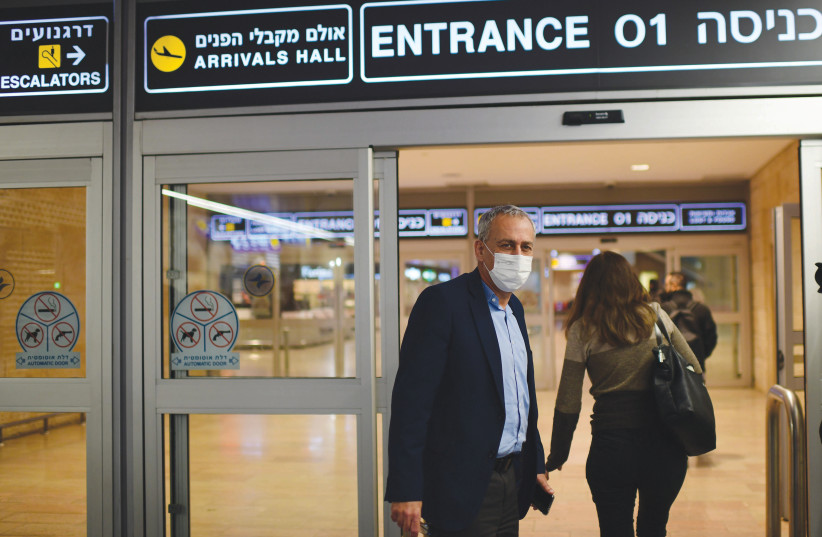Vaccinated foreign nationals from most countries will be able to enter Israel beginning next Sunday, the government said Monday.
In addition, jabbed inbound travelers will only need to quarantine until they receive the results of their PCR test taken upon landing or for the first 24 hours, whichever is shorter, starting from Tuesday.
In both cases, the new rules will not apply to travelers of countries classified as “red” – the highest level of risk of infection.
At the moment, the list of red countries includes the US, the UK, Canada, France, the UAE, Ethiopia, South Africa, Hungary, Tanzania, Nigeria, Spain, Portugal, Switzerland and Turkey.
However, the Health Ministry has recommended removing Canada, Hungary, Nigeria, South Africa, Spain, Portugal and France from the list, pending the coronavirus cabinet’s approval.

To be considered fully vaccinated, individuals need to have been inoculated twice within the previous six months, vaccinated with a booster, recovered with one shot or recovered within six months.
In the short period when Israel kept its borders open in November, the criteria also applied to individuals vaccinated abroad. But only electronic recovery certificates and vaccines approved by the World Health Organization were considered valid for them.
When South African scientists announced to the world that a new, highly mutated variant was causing a surge in cases in their country at the end of November, Israel immediately closed its borders to all foreigners and required everyone entering the country to quarantine for a minimum of three days, including those who were fully vaccinated.
Soon after, Israel also restricted travel for its own citizens by labeling an increasing number of countries as red, meaning Israelis cannot travel there without governmental permission.
The government said the measures would only be temporary and were meant to prevent the variant from penetrating the country or at least to slow it down.
Over the past few days, however, cases have been skyrocketing, a clear sign that Omicron is rampant in Israel. More than 90% of infections are currently happening in the local community and not among returnees from abroad.
“The actions taken at Ben-Gurion Airport over the past month have slowed the entry of Omicron,” Health Minister Nitzan Horowitz (Meretz) tweeted. “But from the beginning I stressed that when the infection happened mostly in the country, there would be no point in closing borders... This is our policy: considerate and balanced.”
Tourism Minister Yoel Razvozov (Yesh Atid) said: “Canceling isolation for the vaccinated inbound travelers from abroad and allowing vaccinated tourism back is the right and just decision at this moment. I thank my colleagues in the government who understood the plight of the tourism industry and agreed with me that the harm outweighs the benefit.”
The Knesset Constitution, Law and Justice Committee plans to meet on Tuesday to approve the new list of red countries.
Committee chairman Gilad Kariv (Labor) said he would cancel all red COVID-19 designations if the Population and Immigration Authority refused to accept the list of exceptions for obtaining permission to travel to and from red countries for humanitarian reasons.
“The variant is already spreading all over Israel, so there is no reason to keep the borders closed at all,” said NGO Yad L’Olim founder Dov Lipman, who has been at the forefront of the fight for better travel rules that are sensitive to the needs of olim (new immigrants) to Israel.
“There is no justification for the continued suffering of olim and their families,” he said. “Yad L’Olim is working with the Knesset Constitution, Law and Justice Committee to not approve these changes unless the exceptions for travel to and from the remaining red countries will be expanded.”
Also on Monday, Diaspora Affairs Minister Nachman Shai asked for a more comprehensive policy to guarantee that relatives of Israelis and foreigners with strong ties to the country are not prevented from entering again.
“I welcome the measures approved today, easing the entry restrictions into Israel for foreign nationals,” he said. “However, a holistic solution must be formed to allow Jews and other foreign nationals from any country who have family in Israel or who are long-term residents here to enter the country on condition that they are vaccinated and comply with quarantine policy.”
“Only by creating this kind of comprehensive, long-term framework can we resolve the tremendous difficulties experienced by Jews and others around the world who have sought to enter the Jewish state during the last two years,” Shai said.
